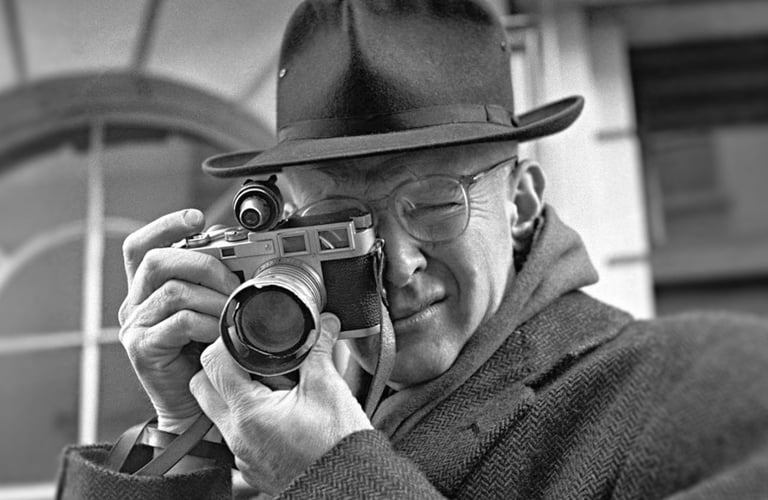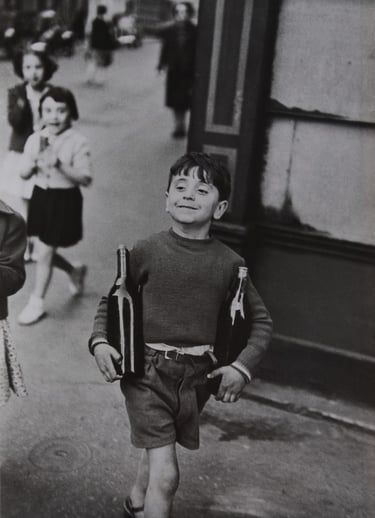Unveiling Henri Cartier-Bresson’s Wisdom: Insights Beyond the Decisive Moment
Henri Cartier-Bresson, a name synonymous with the essence of photography, has left an indelible mark on the world with his candid and thought-provoking imagery. However, it's not just his photographs that continue to inspire generations; his words, too, are a source of profound insight.
While Cartier-Bresson is often associated with the concept of "the decisive moment," it's intriguing to note that he himself did not originate this term. Instead, it was derived from the title of his 1952 book, "Images à la sauvette,"translated into English as "The Decisive Moment." This phrase captures the essence of capturing an event that is ephemeral and spontaneous, yet significant.
Exploring the Timeless Philosophy and Profound Words of Street Photography’s Master


"The Decisive Moment". But Cartier-Bresson's wisdom extends far beyond this well-known phrase. Let's explore some of his quotes and unravel the depth of his photographic philosophy:
"To photograph is to hold one's breath, when all faculties converge to capture fleeting reality."
Here, Cartier-Bresson highlights the immersive and intense nature of photography. It's not just about seeing but about truly experiencing the moment, merging the photographer's intuition, technical skill, and presence of mind. This convergence is what allows a photographer to capture reality in its most transient form.
"Your first 10,000 photographs are your worst."
A humbling reminder from Cartier-Bresson that mastery requires patience and practice. This quote speaks to the importance of perseverance in the craft of photography. Each shot is a learning opportunity, and improvement comes from persistence and the relentless pursuit of excellence.
"It is an illusion that photos are made with the camera… they are made with the eye, heart, and head."
This quote emphasises that photography is more than just a mechanical act. It's an artistic expression that involves vision, emotion, and intellect. Cartier-Bresson urges photographers to look beyond the surface and capture the essence of the subject.
"The picture is good or not from the moment it was caught in the camera."
Cartier-Bresson dismisses the notion of salvaging a poor photograph through editing or manipulation. He believed in the purity of the captured moment, underscoring the importance of intuition and timing in creating a compelling image.
“Seeing is everything.”
This simple yet profound statement encapsulates the essence of Cartier-Bresson's approach to photography. It underscores the importance of observation and the act of truly seeing, beyond merely looking.
“The camera is an instrument that teaches people how to see without a camera.”
Here, Cartier-Bresson suggests that the practice of photography can alter our perception, teaching us to notice and appreciate details, moments, and compositions in everyday life, even when we're not behind the lens.
“In photography, the smallest thing can be a great subject. The little human detail can become a leitmotiv.”
This quote speaks to the power of focusing on the small, seemingly mundane details, revealing their significance and beauty through the photographic frame.
“Reality offers us such wealth that we must cut some of it out on the spot, simplify.”
Cartier-Bresson highlights the challenge photographers face in framing their shots, deciding what to include and what to exclude, in order to convey a clear and impactful message.
“To me, photography is the simultaneous recognition, in a fraction of a second, of the significance of an event.”
This defines the core of the 'decisive moment'—the ability to intuitively recognise and capture an event that is both fleeting and meaningful.
“Composition must be one of our constant preoccupations, but at the moment of shooting it can stem only from our intuition, since we are dealing with an elusive moment where geometrical and psychological relationships are made.”
Cartier-Bresson discusses the complexity of composition in photography, blending technical skill with intuition to capture the right moment.
“We must avoid however snapping away, shooting quickly and without thought, overloading ourselves with unnecessary images that clutter our memory and diminish the clarity of the whole.”
This advice warns against the mindless accumulation of images, advocating for a more thoughtful and discerning approach to photography.
“For me, the camera is a sketchbook, an instrument of intuition and spontaneity, the master of the instant which, in visual terms, questions and decides simultaneously.”
Cartier-Bresson likens the camera to a sketchbook, highlighting its role in capturing spontaneous moments and making instantaneous decisions.
“One has to tiptoe lightly and steal up to one’s quarry; you don’t swish the water when you are fishing.”
In this metaphor, Cartier-Bresson advises photographers to approach their subjects with care and discretion, much like a fisherman trying not to startle the fish.
“Photography is not like painting. There is a creative fraction of a second when you are taking a picture. Your eye must see a composition or an expression that life itself offers you, and you must know with intuition when to click the camera.”
Here, he differentiates photography from painting and emphasises the importance of intuition and timing in capturing a photograph that truly resonates.


These quotes encapsulate Henri Cartier-Bresson's philosophy towards photography—a blend of meticulous observation, intuitive action, and a deep appreciation for the world's spontaneous moments.
Now, regarding the term "the decisive moment," while closely associated with Cartier-Bresson, its origins lie in the translation of his work rather than a direct quotation. This concept, however, perfectly encapsulates his approach to photography—a harmonious blend of instinct, timing, and composition. The decisive moment is about capturing an event that is both fleeting and charged with meaning, a convergence of elements that may never align in quite the same way again. While Cartier-Bresson did not coin the term, he certainly embodied it, demonstrating through his work that photography is an art of observation, a celebration of the here and now, and an invitation to see the extraordinary within the ordinary.
In reflecting on Cartier-Bresson's quotes and the philosophy they convey, we are reminded that photography, at its best, is a reflection of life itself—unpredictable, beautiful, and profoundly human. His legacy, both in imagery and in words, continues to guide and inspire photographers to look deeper, feel more intensely, and capture the moments that truly matter.
Through understanding Cartier-Bresson's perspectives, we gain not just insights into his work but also a deeper appreciation of what it means to see the world through a lens—mindfully, passionately, and always in search of that elusive, decisive moment.
Copyright © 2025 Peter Pickering. All Rights Reserved. All Wrongs Reversed.
🌐 peterpickering.com | 🎺 sessionsonthegreen.com | 💜 isaacbcole.com | ▶️ YouTube Channel | 🌿 life.peterpickering.com


